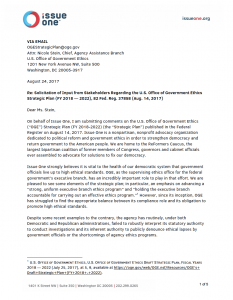Dear Ms. Stein,
On behalf of Issue One, I am submitting comments on the U.S. Office of Government Ethics (“OGE”) Strategic Plan (FY 2018-2022) (the “Strategic Plan”) published in the Federal Register on August 14, 2017. Issue One is a nonpartisan, nonprofit advocacy organization dedicated to political reform and government ethics in order to strengthen democracy and return government to the American people. We are home to the ReFormers Caucus, the largest bipartisan coalition of former members of Congress, governors and cabinet officials ever assembled to advocate for solutions to fix our democracy.
Issue One strongly believes it is vital to the health of our democratic system that government officials live up to high ethical standards. OGE, as the supervising ethics office for the federal government’s executive branch, has an incredibly important role to play in that effort. We are pleased to see some elements of the strategic plan; in particular, an emphasis on advancing a “strong, uniform executive branch ethics program” and “holding the executive branch accountable for carrying out an effective ethics program.”1 However, since its inception, OGE has struggled to find the appropriate balance between its compliance role and its obligation to promote high ethical standards.
Despite some recent examples to the contrary, the agency has routinely, under both Democratic and Republican administrations, failed to robustly interpret its statutory authority to conduct investigations and its inherent authority to publicly denounce ethical lapses by government officials or the shortcomings of agency ethics programs.
Although OGE does not have the power to issue penalties or sanctions, that does not mean it has no power whatsoever. The agency is clearly enabled to “conduct investigations and make findings concerning possible violations of any rule, regulation, or Executive order relating to conflicts of interest or standards of conduct applicable to officers and employees of the executive branch.”2
Furthermore, the agency can clearly offer public comments in an effort to ensure that proper deference is paid to ethical standards. Yet OGE has almost never exercised these powers. Perhaps the only notable example is from nearly 30 years ago, when it issued a public memorandum concerning ethical lapses of then-Attorney General Edwin Meese III in order to provide guidance and to “remind and inform that simply avoiding criminal conduct is not the mark of public service.”3
It is critical that OGE be willing to stand up for government integrity even when that requires delivering bad news to high-ranking officials about conflicts of interest, their need to divest a financial conflict of interest or the need to recuse themselves from a government duty.
Additionally, OGE should not be content with implementing the ethics system as it currently exists. Rather, the agency should promote reforms to improve itself and the entire federal ethics system. Issue One has publicly recommended several changes to OGE that can serve as a model. Those recommendations, which seek to better empower the agency to carry out its mission, are listed below.4
INDEPENDENCE
- Specify in legislation that the Director of OGE may only be terminated for cause
Currently, the Ethics in Government Act states that the Director of OGE serves a five-year term, but does not define when and how he or she may be removed. Clarifying that the Director can only be removed “for cause” would help ensure the agency’s independence and was recommended as early as 1983.
TRANSPARENCY AND CONSISTENCY
- Authorize OGE to serve as a central clearinghouse for all ethics actions taken by designated agency ethics officials (DAEOs)
As the central agency in the ethics process, it makes sense to have OGE serve as a clearinghouse for ethics actions taken by DAEOs and their subordinates. Having decisions from various agencies side by side would promote transparency and consistency. Given modern technology, this would be a relatively low burden for OGE.



